Sep 2, 2023
The heart itself is but a small vessel, yet there are dragons and there are lions; there are poisonous beasts and all the treasures of evil. And there are rough and uneven roads; there are precipices. But there is also God, also the angels, the life and the kingdom, the light and the apostles, the treasures of grace—there are all things. – Pseudo-Macarius, 5th Century
By Brother Matt Schaefer, C.PP.S.
Some years ago, I was going through some spiritual struggles. I had recently completed my formation with the Missionaries of the Precious Blood, and I was trying to figure out how I would live in the world as a Missionary brother. I’d made a commitment to God and to my fellow Missionaries; but how did God want me to live out that commitment? What was I supposed to do about the internal struggle between selfish desires and selfless service? Between my own will and God’s will?
Fortunately, I had a very good spiritual director who helped me sort out my thoughts. She gave me a reading that included the above quote from an unknown homilist. The author offers a wonderful picture of the contradictions residing in the human heart: the capacity to do wrong or do right, the presence of both darkness and the light of God, treacherous beasts and guiding angels. With all that going on, it is no wonder that discerning the will of God can be challenging.
In today’s Gospel, Jesus has a hard lesson for the disciples about God’s will, both for Jesus and for them. Jesus tells them that he will suffer, be killed, and be raised. Peter cannot accept this. The Messiah was expected to be a victorious warrior who would conquer their enemies and lead an earthly kingdom for God’s chosen people. Such a Messiah could not suffer and die. Perhaps Peter was hoping that the loyal disciples would also be spared suffering. Jesus rebukes Peter, “Get behind me, Satan.” This seems harsh, but it highlights the ever-present temptations that interfere with our discernment of God’s will. And Jesus doesn’t say, “Go away, Satan!” No, he instructs Peter to get behind him—in other words, to follow him.
Jesus then instructs his disciples to deny themselves, take up their crosses, and follow him. Denying oneself is not about putting yourself down or erasing your unique identity; it is about respecting yourself as a child of God. To follow Jesus fully, we must avoid selfish desires and worldly temptations so that our lives will be ordered to the will of God. Taking up our crosses isn’t just about accepting the trials and annoyances of life; it means embracing everything that comes with a life devoted to Jesus. Remember that the cross was not just a means of death; it was a shameful and horrific punishment. But we know also the glorious message of the cross—that it is the source of our redemption. Those who are willing to pay the price will be vindicated.
Poor Peter’s heart, like my own, surely had its beasts, temptations, and rocky roads; but in the end he listened to the good things that resided there. He let the angels and the grace of God guide him in his journey to follow Jesus. The will of God is discerned through Scripture, through the teachings and sacraments of the Church, and through prayer. Indeed, the will of God is already present in our hearts; we just have to find it amidst all the distractions. Taking Peter and the disciples as models, may we always be committed to discerning God’s will and following him with joyful, undivided hearts.

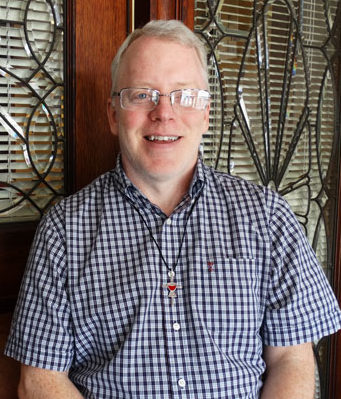
Brother Matthew Schaefer, C.PP.S., is in ministry at the St. Gaspar Family of Parishes in Dayton.
Aug 28, 2023
Fr. James McCabe, C.PP.S.
December 6, 1931–August 27, 2023
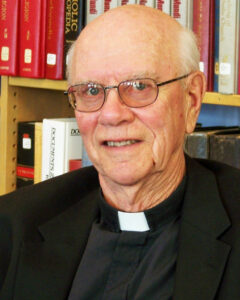 Fr. James McCabe, C.PP.S., 91, died peacefully in his sleep on Sunday morning, August 27, in the infirmary of St. Charles Center, Carthagena, Ohio. He had been in failing health.
Fr. James McCabe, C.PP.S., 91, died peacefully in his sleep on Sunday morning, August 27, in the infirmary of St. Charles Center, Carthagena, Ohio. He had been in failing health.
Fr. McCabe was born in Newcastle, Neb., on December 6, 1931, to Lawrence and Helen (Lewis) McCabe. The family moved to Detroit in 1941, and he considered Detroit his second hometown.
He entered the Congregation in 1945 at Brunnerdale, its former high school seminary near Canton, Ohio, and was ordained on June 1, 1958.
In his years as a priest, he was involved in parish ministry, college administration and leadership of the Congregation.
Fr. McCabe served briefly in parishes after his ordination, then became an instructor and librarian at St. Charles Seminary in Carthagena, Ohio, from 1961–65. During that time, he also served as archivist for the Congregation. In 1965, he became the librarian of Saint Joseph’s College in Rensselaer, Ind., which is sponsored by the Missionaries of the Precious Blood. He earned a master’s degree in library science from Catholic University, Washington DC.
He was instrumental in the growth of another college sponsored by the Missionaries, Calumet College of St. Joseph in Hammond, Ind., where he served first as executive vice president beginning in 1972, then president from 1975–80.
Fr. McCabe returned to parish work in 1982, when he was named pastor of St. Mary of the Woods Church in McQuady, Ky. He became pastor of Immaculate Conception Church in Hawesville, Ky., in 1983.
In 1987, Fr. McCabe was named pastor of Immaculate Conception Church in Celina, Ohio, where he served until 1992, when he was appointed provincial secretary for the Cincinnati Province. He also served the province as its personnel director and had been a member of its senate.
In 1997, Fr. McCabe accepted an assignment to the Sorrowful Mother Shrine in Bellevue, Ohio. He was named director of the shrine in 2000, where he served until his retirement in 2001. He moved to St. Charles Center in 2002.
Fr. McCabe had a genial manner and in parish life, generally led by consensus. He was a good listener and effective preacher, often including his own foibles that drew smiles from listeners. Yet he had a powerful intellect and organizational skills. His nickname in the Congregation, given to him while still at Brunnerdale, was Dux, Latin for “leader.”
He had a lifelong love of books—he learned the trade of bookbinding while a student at St. Charles and pursued it as a hobby later in life. He also loved fishing and birdwatching and was an avowed, if mostly ineffectual, enemy of the squirrels that raided his birdfeeders.
Devoted to his family and the Community, Fr. McCabe knew how to make connections with others, and keep them connected. In the 1990s, Fr. McCabe helped found the Amici, a group of former members and students of the C.PP.S., to establish or re-establish connections with those who had been educated and formed by the Missionaries. For many, it was an important act of reconciliation in keeping with Precious Blood spirituality. He served as Amici coordinator from 1987 to 2005.
Fr. McCabe was the last surviving member of his immediate family. He was preceded in death by his brother, Patrick, and his sister, Shirley Lyle.
He is survived by numerous nieces and nephews, great-nieces and great-nephews.
A Mass of Christian Burial was celebrated at St. Charles Center on Thursday, August 31, at 2 p.m., Fr. Jeffrey Kirch, C.PP.S., provincial director, presiding. Fr. Ken Pleiman, C.PP.S., was the homilist. Burial followed in the Community cemetery.
Memorial contributions may be made to the Missionaries of the Precious Blood United States Province.
Aug 26, 2023
By Fr. Tim McFarland, C.PP.S.
Many times, we hear people having an identity crisis or perhaps we have experienced that in our lives. Today’s Gospel introduces us to ways in which people were discovering and growing in their understanding of Jesus. This can also speak to the ways in which we grow in our understanding of who Jesus is for us. Throughout our lives our image of Jesus changes in response to our situation. Old images of Jesus pass and new ones come to be.
Each of us needs to give a personal answer to Jesus’ question: “Who do you say that I am?” Peter’s response is a solid basis from which to begin. Notice that the phrase “Son of the Living God” expresses more richly what “Christ” means. Peter’s faith comes to him as gift from above, not from any mere logic or ingenuity. Why was the blessing given to him in particular? Perhaps because his humble and contrite spirit made him best prepared to receive it? Or because God chooses whom he wills, irrespective of their merits? Jesus entrusts to Peter whatever is meant by the keys of the Kingdom of Heaven. Upon his solid, dedicated faith the Church will always rely, for unity and encouragement.
This Sunday we are presented with two figures who are given keys. The first is Eliakim. Eliakim was the secretary to Shebna, the Master of King Hezekiah’s palace, back in the 8th century before Christ. According to the first reading from Isaiah, Shebna lost favor with the Lord and was replaced by Eliakim. Isaiah says that God placed the keys of the kingdom on Eliakim’s shoulder. He would be Master of the palace and the one through whom others would have to go to get access to the King.
The Gospel reading presents Peter as receiving the keys of the Kingdom of God. Like Eliakim, he would determine who has access to the King. Peter is usually pictured as carrying large keys, representing the authority given to him by the Lord. It is interesting that Peter, whom we know had his weaknesses, receives the keys to the Kingdom. This should give us hope that despite our weaknesses and failures, we too are called to proclaim the Kingdom in word and action.
In these passages, keys are interpreted as signs of authority and that is the foundation for our belief in the authority of the pope, Peter’s successor. I suggest that we might look at the key in a different way. A key can also be seen as a guide, like an answer key to an exam. Our faith in Jesus gives us a key to better understand our lives. We can use the “key” of our Precious Blood spirituality. Our spirituality can give us a key to cope with suffering in our lives, to reconcile differences among people, and to form communities. The scriptures today pose a question, similar to the question posed by Jesus: how does our faith, our spirituality, serve as a key to our lives?
To view the full scripture reading, click here.

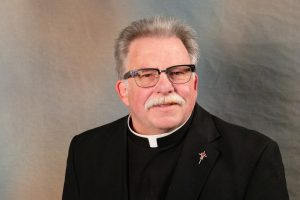
Fr. Tim McFarland, C.PP.S., is the director of ministry and mission and serves on the faculty at Calumet College of St. Joseph in Whiting, Ind.
Aug 19, 2023
By Vicky Otto
The older I get, the more I admire the women we read about in the Gospels. Each, in their way, has taught me essential life lessons. Mary taught me the importance of saying yes to God. The women who stood at the crucifix demonstrated the importance of fidelity to relationships. And Mary Magdalene taught me about bravery, courage and speaking truth to power.
This weekend, I add the voice of the Canaanite woman in the Gospel that we hear proclaimed this week. A friend this week told me that when she read a reflection about her, the chapter was called “The Uppity Woman.” I have learned a lot from uppity women; this Sunday, the lesson is about tenacity, persistence and faith, even when faced with one obstacle after another.
This week’s Gospel can be challenging to proclaim, preach about, and listen to because the comments Jesus makes can be perceived as harsh and insensitive. It is important to note that Jesus’s words and actions to the Canaanite woman made sense for his time and culture. It does not make them right, yet it is the world in which Jesus and the woman meet.
This meeting of the two is the first lesson the woman offers; she shows up. She shows up knowing she is not welcomed or wanted; she is an outsider on the fringes of society. She does so because she wants to save her daughter. Nothing would keep her from reaching out to Jesus, even when the world seems to set up everything against her.
As the woman and Jesus conversed, the woman offered the next lesson, persistence. We don’t know why Jesus acted the way he did. Yet every time he tries to push her away, she returns, respectfully yet persistently. Her faith led her to believe there was enough for everyone, even the dogs. She wasn’t begging for a feast; she was begging for a crumb, knowing that crumb would save her daughter.
As she banters back and forth with Jesus, a writer noted that she was helping him learn about his vocation. Jesus was impressed with her vision and inspired by her tenacity. While he told the disciples that he was sent only to the lost sheep of the house of Israel, he now can embrace a vision of a table stretched to include a far more diverse group of diners.
I would like to believe that we each have the tenacity and persistence to reach out in faith the same way the Canaanite woman did. She is a true testament to our spirituality that God’s love knows no boundaries, and there is enough for everyone.
To view the full scripture reading, click here.

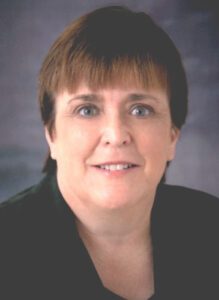
Vicky Otto is the executive director of the Precious Blood Spirituality Institute. She is also a Companion of the Missionaries of the Precious Blood.
Aug 15, 2023
A message on the anniversary of C.PP.S. founding from our
Provincial Director Fr. Jeffrey Kirch, C.PP.S.
As we mark another year of life in our Congregation—208 years now since our founding in 1815 by St. Gaspar del Bufalo—my thoughts turn to his thoughts in those early days. How did he envision the future? How did he attract people to the new Congregation and its mission of renewing the Church and the world through the power of the Precious Blood?
Missionaries have been faithful to that mission ever since, with God’s help. We might even say that renewal and reconciliation are just as important today than in Gaspar’s day. We never have to worry about running out of work.
And the Precious Blood family does not run out of energy. Not our Missionaries, not the sisters’ congregations that are also under the banner of the Precious Blood, not our lay associates or those who faithfully support our work.
It is heartening to me to see the many ways that Missionaries carry out their ministry, and the mission of our Congregation. As provincial director, I am privileged to sit with members as they talk about their dreams, plans and preferences. As we talk, we are working together for the good of the Congregation, the good of the Church, and the good of the member. I believe that all of that can be aligned, with God’s guiding hand.
I like the way our Fr. Ben Berinti, C.PP.S., described life as a Missionary of the Precious Blood in a recent article in the Florida Catholic. Fr. Ben spoke of “the joy of being set down smack dab in the middle of daily life with real people trying to find ways to answer the call of Christ to the fullness of life he offers.
“The blood of Christ is all about LIFE…there is life in the Blood. And so, as a Missionary of the Precious Blood, I am called to lift up life and the saving work of Christ rather than to judge, criticize, offer a negative outlook, lament how terrible the world is, etc. I am called to be a positive force for life and growth, to be a person of hope and encouragement.”
Let us all be people of hope and encouragement. Let us all find life in the Precious Blood of Jesus.
Aug 12, 2023
By Fr. Tony Fortman, C.PP.S.
Today, we see Jesus walking on the water, a miracle indeed. This is a violation of a natural occurrence. Peter also walks on the water until he takes his eyes off Jesus.
I can remember my first swimming lesson at Spring Lake in Pandora, Ohio. I actually got thrown into the water. I then did my best to dog paddle back to the cement wall. Some may say that this is a crude way to teach someone swim. It might have been, but it was effective.
Each day, you and I are thrown into this arena called life. We may have some expertise in daily experiences. But there are times when we are out of our element. We don’t know which way to turn. Peter was willing to step out of the boat. He was willing to take a chance.
I commend Peter in his belief and action. I admit that sometimes I don’t want to leave the boat and its security. Peter denies Jesus three times but he was willing to follow him. He was willing to speak when others would remain silent. That has to catch your attention. Many times Peter was not in control of the future but he was willing to speak up. Yes, he put his foot in his mouth many times. He did not follow through on what he said. Remember when Peter said that he would even die for Christ? But he denied him right away. Peter did die for Jesus but it took a while for him to have the courage to stand for Christ.
In some of my conversations with people, I see I don’t always want to speak up to reveal myself in speech, and maybe they don’t either. I want to play it safe. I want people to appreciate me. I don’t want to be seen as being wrong. I want to have a perfect record in the eyes of others. But when I am not willing to take a chance and speak up or risk being wrong in the eyes of others, then I actually die.
I don’t have to impress others. I just have to be willing to be a disciple of Christ. I don’t need other people’s approval. In fact, many people will disagree with what I say. God wants me to give my best to others now. God is asking all of us to get out of the boat. Stop playing it safe and stop being a perfectionist. Stop judging others from your safe perch. God and others need you to be you. You will make mistakes. There will be people waiting to laugh at you and say that you’re wrong. Don’t look for consolation from others but look to Christ’s affirmation. Keep your eyes on Jesus. God bless you all.

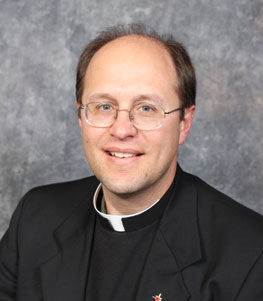
Fr. Tony Fortman, C.PP.S., is the pastor of the St. Gaspar Family of Parishes in Dayton.
![]()


 Fr. James McCabe, C.PP.S., 91, died peacefully in his sleep on Sunday morning, August 27, in the infirmary of St. Charles Center, Carthagena, Ohio. He had been in failing health.
Fr. James McCabe, C.PP.S., 91, died peacefully in his sleep on Sunday morning, August 27, in the infirmary of St. Charles Center, Carthagena, Ohio. He had been in failing health.

